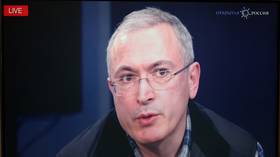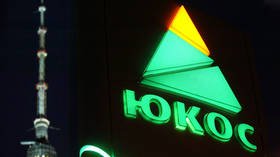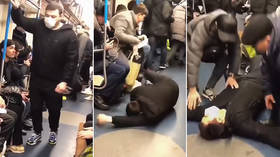Former Yeltsin-era oligarch Khodorkovsky denies he admitted guilt to Putin in exchange for 2013 presidential pardon

Mikhail Khodorkovsky, once Russia’s wealthiest man, clashed with Vladimir Putin, on Thursday, over whether he had privately confessed he was guilty of fraud, as a $50 billion legal battle over his former oil empire rages on.
On Thursday, the president told reporters that the oligarch had “indirectly admitted [guilt], in a letter to me and asked for release ahead of schedule because his mother was sick and dying.” The president added that “I might be wrong, but I think it’s required by law that someone has to admit their guilt – because how else can you pardon them?”
However, in a statement to his MBK media network, which he named after himself, Khodorkovsky fiercely denied the suggestion that he had ever confessed to the charges. “There was no direct or indirect confession of guilt,” he said. “Vladimir Putin either really does not remember that I refused any pardon that required an admission of guilt or is being deliberately misleading. I am grateful to him that he gave me the opportunity to say goodbye to my mother, and won’t hold it against him if this is down to age-related forgetfulness.”
Also on rt.com Yukos case: Netherlands prepares for hearing in $50 billion plus legal battle over disgraced ex-oligarch’s former oil empireKhodorkovsky was released from prison by Presidential decree, in 2013. Originally arrested on fraud charges in 2003, he was convicted of a slew of offenses, including embezzlement and money laundering, facing a quarter of a century behind bars. He has consistently argued that the charges were trumped up because of his political activism. Since then, the billionaire has lived in effective exile in London and Switzerland, where he has continued his opposition campaign against the Kremlin.
Yukos, the oil company that was formerly the jewel in Khodorkovsky’s crown, collapsed shortly after his arrest. At its height it pumped out 20 per cent of Russia’s oil, making it one of the world’s largest businesses. Khodorkovsky, who once had served as an economic adviser to former Russian President Boris Yeltsin's government, had acquired it in a dubious sell-off of state assets. A fellow political aide called the controversial auction “the swindle of the century,” as Khodorkovsky bought up around $5 billion of assets with only $170 million in cash.
A long-running legal battle is now working its way through the courts in the Netherlands and the US, where former shareholders of the business are seeking damages from the Russian government, which they claim “appropriated” the business.
Like this story? Share it with a friend!
















